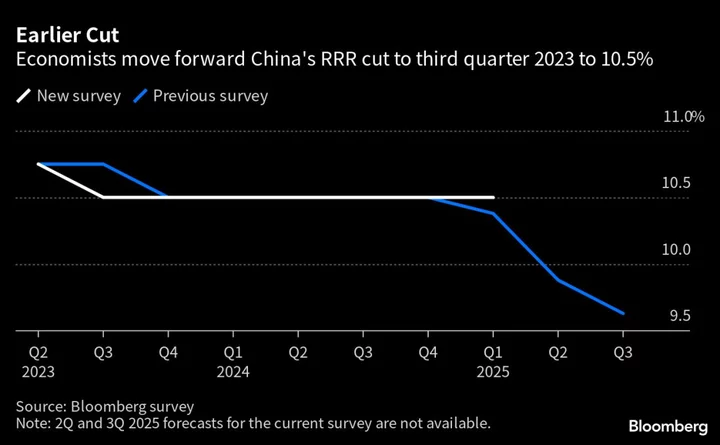China’s central bank will likely cut the reserve requirement ratio for major banks earlier than expected as the economic recovery loses steam, according to the latest Bloomberg survey of economists.
The People’s Bank of China is expected to cut the ratio — or the amount of cash banks have to keep in reserve — for major lenders by 25 basis points by the end of the third quarter of 2023, according to the median of forecasts. Economists had earlier predicted a cut in the final three months of the year.
A cut by that amount would bring the ratio down to 10.5% from 10.75%. The survey respondents saw the ratio likely to stay on hold until at least the end of 2024 if it’s trimmed this year.
China’s economic recovery has lost momentum in recent weeks after an initial burst in consumer activity. Data this month showed industrial output, retail sales and fixed investment growing at slower paces than expected, while inflation is close to zero and consumers have been reluctant to borrow.
Economists surveyed by Bloomberg now expect China’s gross domestic product to expand 5.5% this year from a year ago, edging down from a prior estimate of 5.6%. The government has set a fairly conservative growth goal of around 5% for the year.
The slowing economic momentum has led to speculation over whether the central bank will ease policy to spur the recovery. Research by Bloomberg Economics shows a 25 basis-point reduction in the RRR would give the economy a bigger growth boost than a 10 basis-point cut in the PBOC’s key interest rates.
Economists surveyed by Bloomberg predict the rate on the one-year policy loans will be left unchanged this year. They also saw no adjustments to the one-year loan prime rate, a benchmark lending rate for commercial lenders.
The PBOC has so far refrained from cutting interest rates despite the slowing economy, most recently keeping its rate on the one-year policy loans at 2.75% for a ninth month last week. At the same time, it did inject more long-term liquidity into the financial system for the sixth month on the same day, after lowering the reserve requirement ratio for banks in March.
Onshore swaps traders are boosting bets on Chinese monetary easing to the most since November. The cost of 12-month interest-rate swaps, which anticipate where interest rates will be in a year’s time, slipped to 2.06% this week. That’s down from as high as 2.47% just over two months ago.
“The government’s conservative 2023 GDP growth target of 5% provides some room for the central bank to be patient on monetary policy easing,” said Brian Lee, economist at Maybank Securities.
He said authorities instead are relying on more targeted policy measures, such as encouraging more investment in infrastructure and manufacturing, as well as city-level property easing moves.
BNP Paribas Asset Management and Nomura Holdings Inc. are advising clients to buy China government bonds as the weak economy is likely to drive down yields even further.
Nomura analysts are targeting a decline to 2.30% yield on five-year government bonds by the middle of July. The yield traded at 2.49%, after touching a six-month low Tuesday.
Other major points in the survey:
- The growth outlook for the second quarter was cut to 7.7% year-on-year from 8%, weighed down by the uneven recovery
- Economists see GDP growth moderating to 4.9% next year and 4.6% in 2025
- Forecasts for 2023 retail sales growth were lowered to 9.2% from 10.2% previously. Analysts see sales expanding 7.3% in 2024, higher than earlier forecasts
- Industrial output is expected to expand 5.1% this year, down from an earlier estimate of 5.5%
- Exports will likely grow 0.7% in 2023, better than a projected contraction in the prior survey
- Import growth is seen turning stagnant this year, down from prior expectations for a slight expansion
- Consumer inflation for the year was projected at 1.7%, down from earlier estimates of 2.1%
- Producer deflation was seen deepening, down 1.4% from 0.9% in the prior survey
--With assistance from Tania Chen.
(Adds market updates and analysis.)

